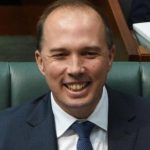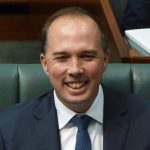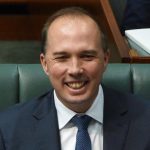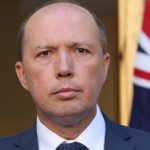Peter as PM: What Would it Mean for Australia?
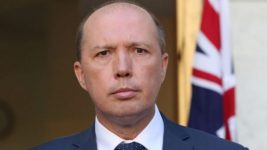
Peter Dutton recently failed in his bid to overthrow Malcolm Turnbull for the prime ministership, although supporters inside the Liberal party have not ruled out further challenges amidst poor leadership polling.
Mr Turnbull won the Liberal party ballot by 48 votes to 35, with Dutton and several of his supporters resigning or offering to do so in the aftermath.
Recent polling
The Coalition has suffered a drop in its primary vote from 39% to 33% over the past month, and is now well behind Labor in the two party preferred vote.
Under Mr Turnbull, the government has trailed Labor in 38 consecutive Newspolls. There have also been swings to Labor in a number of by-elections, as the Coalition comes under fire for its highly publicised opposition to the banking royal commission and its corporate tax cuts – adding to concerns the PM only cares about the ‘big end of town’.
Dutton far from dead
Despite stepping down as Home Affairs Minister, many believe Peter Dutton will regroup and mount another challenge before the next election.
Commentators point out that Turnbull’s leadership is so shaky, he was forced to do a backflip on his commitment to an emissions reduction target in order to appease conservative factions within the Liberal party. It has been noted that Turnbull was previously so intent on the scheme that he famously crossed the floor to vote with the Labor party in support of it.
Some have now accused him of selling out his principles to retain his leadership, thereby further reducing his credibility as a leader.
Dutton may lose Dickson
But while Dutton enjoys significant support in the Party room, he may be on the brink of losing his seat of Dickson.
In the 2016 election, Mr Dutton suffered a 5.2 percent swing against him, leaving him with a mere 1.6 percent margin.
And then there’s GetUp’s campaign labelled ‘Time to Ditch Dutton’, which is lobbying to oust him from parliament.
Ineligible for parliament?
It has also been reported that Mr Dutton may ineligible for parliament on the basis of having a “… direct or indirect pecuniary interest in any agreement with the Public Service of the Commonwealth”.
Dutton’s register of financial interests suggests he is a beneficiary of ‘RHT Family Trust’, which operates two childcare centres that receive financial subsidies from the federal government.
This, it is suggested, may amount to a breach of section 44 of the Commonwealth Constitution which, among other things, disqualifies an individual from sitting in parliament if he or she, “has any direct or indirect pecuniary interest in any agreement with the Public Service of the Commonwealth otherwise than as a member and in common with the other members of an incorporated company consisting of more than twenty-five persons”.
Champion of the authoritarian
In terms of policy decisions, Mr Dutton has become a champion of those who support an increase in state power at the expense of legal protections and safeguards.
And his outspoken views have attracted criticism both inside the nation and abroad.
Racism
Some of Mr Dutton’s more controversial moves include:
- Being the only frontbencher to boycott Kevin Rudd’s apology to the Stolen Generations in 2008.
- Stating in 2016 that letting Lebanese migrants into Australia in the 1970s was a mistake.
- Claiming in January of this year that residents of Melbourne were too scared to go to dinner because of a so-called African gang crisis.
- Refusing to let any asylum seekers into Australia, including self-harming children and women who were sexually assaulted in immigration centres.
- Despite his position on immigration, saying the government should concentrate on giving assistance to white South African farmers.
Leave the vulnerable to suffer
In a move that infuriated the legal profession, refugee advocates and many concerned citizens, Mr Dutton accused lawyers who represent Asylum seekers on a pro bono basis of being un-Australian.
He claimed these lawyers, many of whom are working tirelessly free of charge, “have been playing the game” for far too long, and that the nation was “not going to be taken for a ride.”
He also blamed lawyers for costing taxpayers “tens of millions of dollars” by pursuing High Court proceedings for Australia’s abuse of asylum seekers. The government eventually settled the claim for $70 million, which in the eyes of many represented an acknowledgment of guilt for the physical and psychological harm inflicted upon more than 1900 detainees on Manus Island between 2012 and 2016.
Nicholas Stewart, member of the Australian Lawyers for Human RIghts executive management committee, said at the time that “the rule of law” requires that all people subject to “Australian government authority are entitled to due process and to legal representation in order to pursue their legal rights.”
Mr Dutton’s statements earned him a stern rebuke from then Attorney-General George Brandis.
Judge, jury and executioner
Dutton has been widely criticised for expressing disdain for the fundamental democratic concepts of judicial independence and the separation of government powers – preferring that only he and his colleagues be responsible for both passing and enforcing laws.
He famously lashed out at the Administrative Appeals Tribunal (AAT) for overturning visa decisions made by himself or his delegates. This prompted Law Council of Australia president Fiona McLeod to criticise the minister for seeking to undermine judicial processes, which were carried out “in accordance with law, not personal preference or ideology”
Dutton has frequently lambasted the Victorian judiciary as “civil libertarians” who let offenders get away with crime and reoffending.
He claimed Victorians were “bemused” by “the jokes of sentences being handed down” to offenders, and the “political correctness that’s taken hold” of the state’s judiciary. According to Dutton, “The solution, in part, is to make sure that the appointments that you’re making to the magistrates’ court, are people who will impose sentences and will provide some deterrence.”
Indeed if Dutton had his way, he would be empowered to select and remove members of the judiciary at will, turning magistrates and judges into his pawns.
In the eyes of many, it is a relief that Dutton’s leadership challenge has failed – but who knows what could happen in the future?



